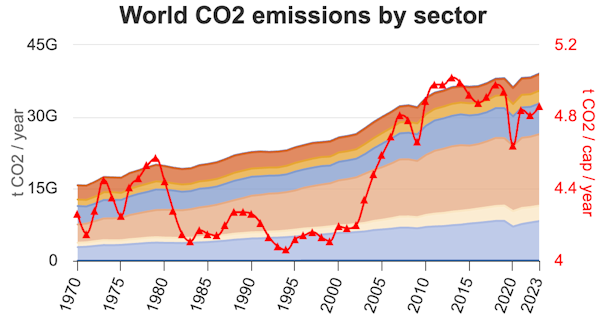SEJournal Online is the digital news magazine of the Society of Environmental Journalists. Learn more about SEJournal Online, including submission, subscription and advertising information.
 |
 |
| The European Commission’s greenhouse gas emissions database project, EDGAR, is easier to access and use, covers all nations and is consistent in its methodology, reports Toolbox. Image: European Commission. |
Reporter’s Toolbox: As COP29 Begins, Where Can You Get Good Climate Emissions Data?
By Joseph A. Davis
Whether the global climate meeting that began Nov. 11 in the oil-producing nation of Azerbaijan is a hit or a miss, journalists reporting on it will need good data. There are several databases on global greenhouse gas emissions. Whether they are any good is another matter.
The big picture is pretty clear, despite fuzziness in the figures. China dwarfs other nations’ emissions and a few highly industrialized nations emit most of the rest: the U.S., India, Europe, Russia and Japan.
You would think the best data might come from the U.N. Framework Convention on Climate Change. This is the convening authority for the climate talks — the 29th Conference of Parties, or COP29. But you would be wrong.
Nations are required to self-report their
emissions and verify their accuracy. But
the UNFCCC numbers are incomplete,
questionable and hard to use.
Nations are required, under the climate treaty, to self-report their emissions and to verify their accuracy. But the UNFCCC numbers are incomplete, questionable and hard to use. Making them harder to use is the UNFCCC division of the numbers into those for developed and developing nations. Not to mention that some nations have an interest in undercounting their own emissions.
So we prefer the numbers from the Emissions Database for Global Atmospheric Research. EDGAR is a project of the European Commission. It is easier to access and use, covers all nations and is consistent in its methodology. Find the latest data here.
Where the data comes from
EDGAR calculates its data from scratch, compiled by a large group of experts using the best available data on different economic activities for each covered nation. It documents its methodology here.
Yes, carbon dioxide from fossil fuel combustion is still the biggest contributor. But other sources matter, too. Like methane — from oil and gas flaring, venting and leaking, not to mention cattle and other agricultural sources, landfills and more.
There are many others: nitrous oxide from agriculture and fuel combustion, and many hydrofluorocarbon gases. We think EDGAR does a better job of normalizing the different gases and integrating them into totals.
You may call it “data” — but remember that the numbers are mostly estimates based on data about economic activity. However, for some gases and for some nations (like the U.S. Greenhouse Gas Inventory), the values are actual measured data.
How to use the data smartly
Remember that time matters in several ways. Year-to-year time series are important because what matters most is whether the numbers are going up or down. (Spoiler: they are usually going up.) The data pipeline is slow enough to leave a time lag of a year or more.
Place (or nation) matters, too. The biggest emitters are large or developed countries. Aruba is not in the same league as Brazil or Russia. The biggest victims are often smaller and poorer nations.
We shouldn't have to say it, but goals for a date decades away are not the same as right-now accomplishments. The term “net-zero” is often misleading, because it uses offsets to mask continuing emissions. Offsets balance emissions against far-away, hard-to-measure sinks like forest preservation. And many of these offset schemes are scams.
You can ground your understanding of the data by talking to experts about what it means.
[Editor’s Note: For more on covering climate change, see our Topics on the Beat page, which includes more than three dozen stories on the topic, along with our Climate Change Resource Guide and a special report on Covering Climate Solutions, plus climate change headlines from EJToday.]
Joseph A. Davis is a freelance writer/editor in Washington, D.C. who has been writing about the environment since 1976. He writes SEJournal Online's TipSheet, Reporter's Toolbox and Issue Backgrounder, and curates SEJ's weekday news headlines service EJToday and @EJTodayNews. Davis also directs SEJ's Freedom of Information Project and writes the WatchDog opinion column.
* From the weekly news magazine SEJournal Online, Vol. 9, No. 41. Content from each new issue of SEJournal Online is available to the public via the SEJournal Online main page. Subscribe to the e-newsletter here. And see past issues of the SEJournal archived here.













 Advertisement
Advertisement 



